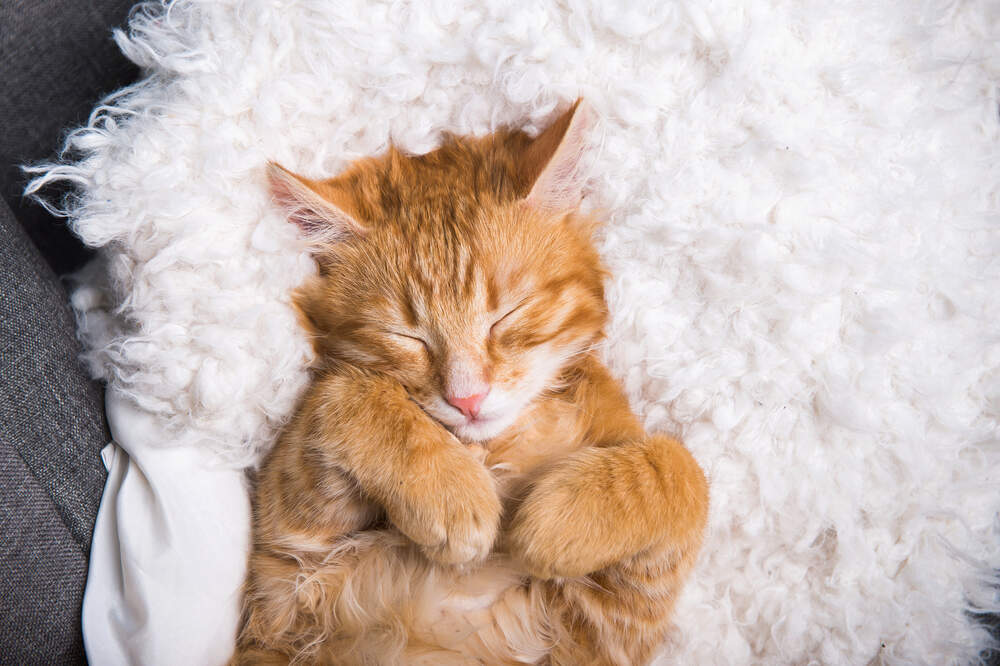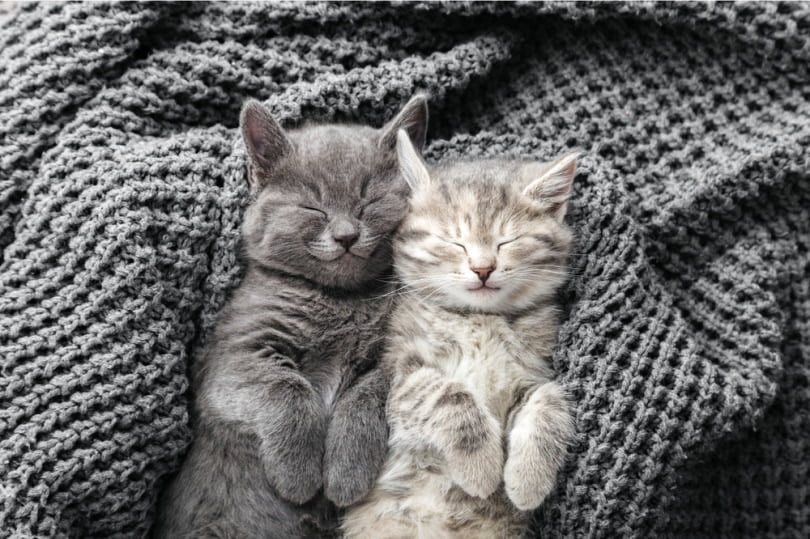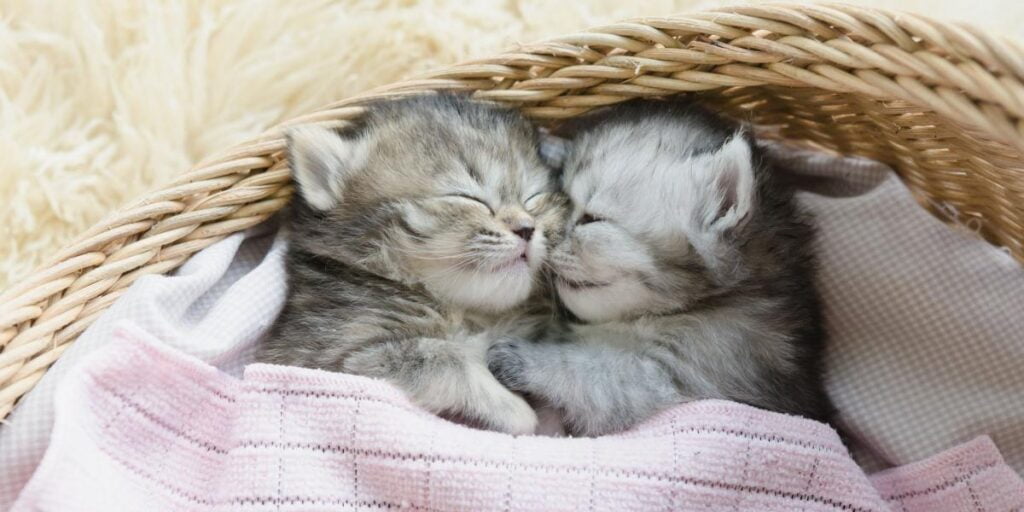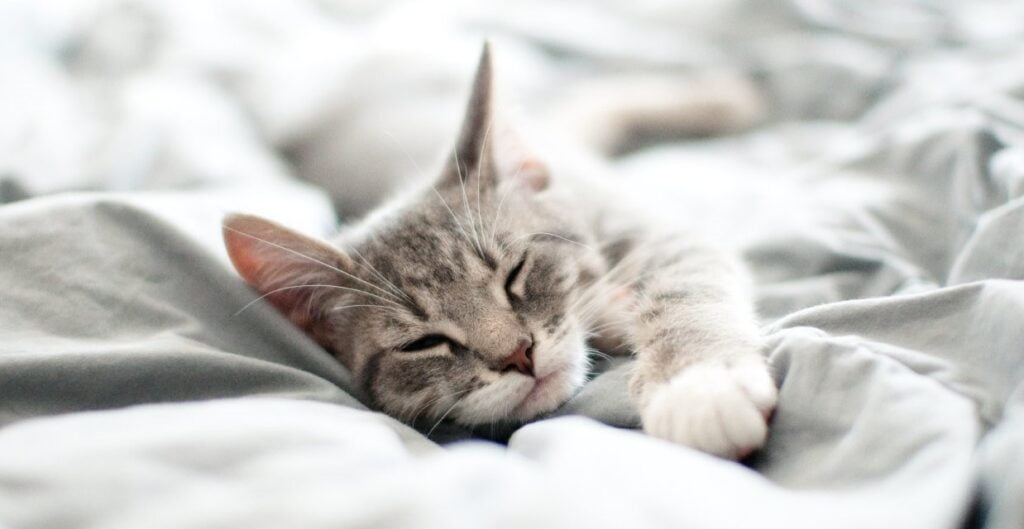How Long Do Kittens Sleep? (Everything you need to Know)

If you’re a new kitten owner, you might be wondering how much your furry friend will sleep. Kittens are known for their love of napping, but just how much sleep do they need? Is sleeping too much bad for them? In this article, we’ll explore everything you need to know about kitten sleep patterns, including how long kittens sleep, what factors affect their sleep, and how to help your kitten get the rest they need.
Importance of Sleep for Kittens
Kittens, like all young animals, need a lot of sleep. Sleep is essential for kittens because it helps them grow and develop properly. Newborn kittens can sleep for up to 22 hours a day, while slightly older kittens may sleep between 16-20 hours a day.
The rest helps them to conserve energy, which is essential for their growth and development. Additionally, sleep helps kittens to develop a strong immune system, and it is crucial for their overall health.
If kittens don’t get enough sleep, they can become more prone to illness and infections. Lack of sleep can also affect their cognitive development and learning abilities, which can have a lasting impact on their behavior as they grow older.
Furthermore, insufficient sleep can cause behavioral problems such as hyperactivity, irritability, and aggression. It’s essential to ensure that kittens get enough sleep by providing them with a quiet and comfortable sleeping environment. This helps to promote healthy sleep patterns, which are crucial for their overall wellbeing.

How Long do Kittens normally Sleep?
Kittens, especially newborns, require an incredible amount of sleep to promote healthy development. Newborn kittens can sleep for up to 22 hours a day, which is necessary for their growth and development. However, as they age, their sleep patterns change gradually.
Kittens between two to three weeks old begin to sleep less and play more. At six to eight weeks old, they typically sleep between 16-20 hours a day. When they reach four to six months old, their sleep patterns will begin to resemble that of adult cats, sleeping between 12-16 hours a day.
However, it is important to note that each kitten is unique and may require more or less sleep depending on their individual needs. This might lead you to wonder, does sleeping to much have a negative effect on a kitten?
Is Too Much Sleep Bad for a Kitten?
While kittens need a lot of sleep, it’s essential to monitor their sleep habits to ensure they’re not sleeping too much .Although sleeping too much is generally not a problem for kittens, it can be an indication of an underlying issue. In some cases, excessive sleep may be a symptom of an illness or other health issue.
If a kitten is consistently sleeping more than what is normal for their age range, it could be a sign of an underlying health issue. Some possible reasons for excessive sleep in kittens include anemia, infections, and issues with their immune system.
Kittens that sleep too much may not be getting enough nutrients, and they may not be growing and developing correctly. As a result, they may become weaker and more prone to illnesses. Moreover, sleeping too much can lead to obesity and other health problems in the long run, which can be detrimental to their overall health and quality of life.
Therefore, if you notice your kitten sleeping excessively, it’s important to consult with your veterinarian to ensure that they are healthy and receiving the proper care. We have also discussed some solutions later on in the article that you can use.

Impacts of under-sleeping in Kittens
While sleeping too much can be a sign of an underlying health issue, under-sleeping can also have negative effects on a kitten’s health and wellbeing. When kittens don’t get enough sleep, it can lead to several problems, including stunted growth and development, weakened immune systems, and behavioral issues.
One of the most important reasons kittens need sleep is for growth and development. During sleep, the body releases growth hormones that help kittens grow and develop properly. If they don’t get enough sleep, they may not be able to produce enough of these hormones, which can lead to stunted growth and developmental delays.
Additionally, lack of sleep can weaken a kitten’s immune system, making them more susceptible to illness and infections. Sleep plays a crucial role in repairing and strengthening the immune system, so when kittens don’t get enough sleep, their immune system may not function as well as it should.
Under-sleeping can also lead to behavioral problems in kittens. Sleep deprivation can cause irritability, aggression, and hyperactivity, which can be challenging to manage and may require professional intervention.
Moreover, chronic under-sleeping can cause long-term health problems in kittens, such as obesity and heart disease. Lack of sleep can disrupt the body’s natural processes, including metabolism and hormone regulation, which can lead to weight gain and other health issues over time.

Encouraging Good Sleeping Habits
Now that we know the importance of good sleep for you kittens, let’s explore how we can make sure they get the right amount of sleep they need.
There are several techniques you can use to encourage good sleeping habits in your kitten. Each technique offers its unique benefits and can help ensure that your kitten gets enough sleep for healthy growth and development.
(1) Create a Comfortable Sleeping Environment
The first step in promoting healthy sleeping habits for your kitten is creating a comfortable sleeping environment. Make sure the sleeping area is quiet, dark, and free of distractions. The bed or crate should be large enough to accommodate your kitten’s size and provide a soft, comfortable surface for them to sleep on.
Consider using a comfortable pet bed, and placing it in a secluded area away from high traffic areas, loud noises, and direct sunlight. A comfortable sleeping area can help reduce stress and anxiety, promoting restful sleep and healthy habits.
(2) Stick to a Consistent Schedule
Cats are creatures of habit, and they thrive on consistency. Establish a consistent schedule for your kitten’s daily activities, including feeding times, playtime, and sleeping time. Consistency can help your kitten establish a healthy sleep routine and minimize disruptions that can affect their sleep quality.
(3) Engage in Playtime and Exercise
Kittens are active animals, and regular playtime and exercise can help burn off excess energy and promote better sleep quality. Engage your kitten in regular playtime sessions throughout the day, and provide them with interactive toys that encourage physical activity.
(4) Provide Mental Stimulation
Mental stimulation is essential for your kitten’s overall health and wellbeing, and it can help promote better sleep quality. Provide your kitten with toys and puzzles that encourage problem-solving and critical thinking. Mental stimulation can help tire out your kitten’s mind and promote restful sleep.
(5) Avoid Overstimulation Before Bedtime
Avoid overstimulation activities like loud music, bright lights, and rough play before bedtime. These activities can overexcite your kitten and make it difficult for them to settle down for sleep. Instead, opt for calming activities like gentle petting, soft music, or a cozy snuggle session.
Sometimes cats end up with “inverted schedules”, which means they stay awake during the night, and sleep during the day. This can cause problems for you as well, so it’s important to get your kitten’s schedule back on track.
(6) Monitor their Diet
Kittens have specific dietary requirements, and their diet can impact their sleep quality. Ensure your kitten is eating a well-balanced diet that provides them with the necessary nutrients they need for growth and development. Avoid feeding your kitten large meals before bedtime, as this can lead to digestive issues that can disrupt their sleep.
(7) Consult with a Veterinarian
If you notice any changes in your kitten’s sleeping habits, or they’re consistently sleeping too much or too little, consult with a veterinarian. They can help identify any underlying health issues that may be affecting their sleep and provide treatment options to ensure your kitten gets the rest they need.
Conclusion
In conclusion, sleep is essential for a kitten’s growth and development, and they require a lot of it, especially in the early stages of their life. Lack of sleep can have a lasting impact on their overall health and wellbeing, while excessive sleep can be a symptom of an underlying health issue.
Encouraging good sleeping habits such as creating a comfortable sleeping environment, establishing a routine, and providing mental and physical stimulation, can help ensure that your kitten gets the right amount of sleep they need for healthy growth and development.
If you notice any unusual sleeping patterns, it is essential to consult with a veterinarian to ensure that your kitten is healthy and receiving the proper care.


